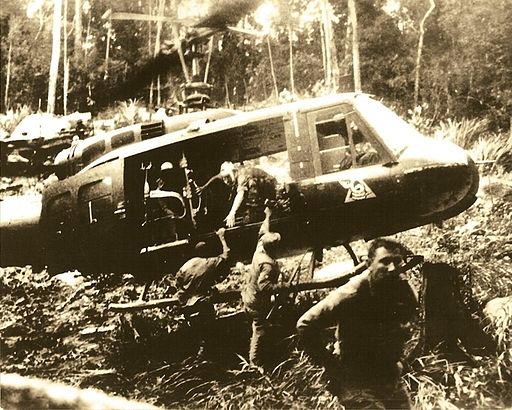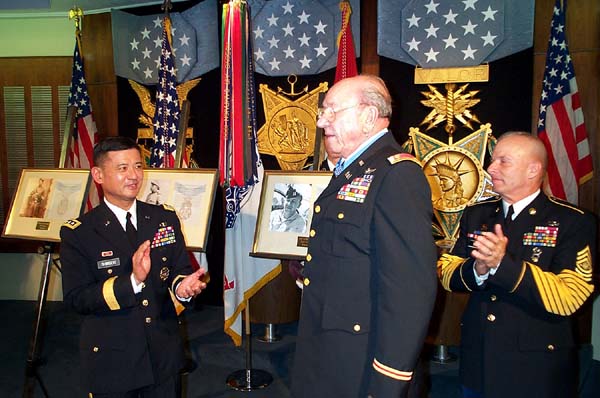A true hero is recognized by the strength of his character and actions in times of life-threatening situations. A true hero goes above and beyond the call of duty to serve his country by demonstrating superb courage, bravery, and leadership. The late Army helicopter pilot and Congressional Medal of Honor recipient Army Capt. Ed W. Freeman was a true hero.
Capt. Ed W. Freeman was born on November 20, 1927 in Neely, Mississippi and was the sixth of nine children growing up. As a young teenager, Freeman saw thousands of military personnel pass by his small Mississippi hometown. Inspired by their call to duty, Freeman decided to enlist in the Navy at age 17 and served on the USS Cacapon for two years.
After World War II, Freeman graduated from high school and enlisted in the Army. Not only did he serve in World War II, but Freeman also served in the Korean and Vietnam Wars. He became a Master Sergeant in the Army Corps of Engineers. Specifically, he fought in the Battle of Pork Chop Hill during the Korean War and was later awarded Battlefield Commission, which gave him the opportunity to apply for flight school.
Freeman earned the nickname “Too Tall” because his 6’4” height was considered too tall to fly helicopters for the Army. The Army’s height restriction at that time was 6’2”.
He first flew fixed-wing aircraft and later switched to helicopters, having logged thousands of hours in chopper flight training.
In 1955, the Army’s height regulations changed to allow Freeman to fly. During the Vietnam War in 1965, Freeman was assigned to the Army’s 1st Cavalry Division.
Freeman’s life is most remembered for the events that occurred on November 14, 1965. At the time, he was a flight leader and second in command of a 16-helicopter lift unit of the 229th Assault Helicopter Battalion with the 1st Cavalry Division.
 The brutal fight on November 14, 1965 was the first major confrontation between the large American and North Vietnamese forces. The fighting was so fierce that medevac units refused to step in and help rescue other soldiers because the battle was too dangerous.
The brutal fight on November 14, 1965 was the first major confrontation between the large American and North Vietnamese forces. The fighting was so fierce that medevac units refused to step in and help rescue other soldiers because the battle was too dangerous.
Freeman’s unit was almost out of ammunition after fighting off the enemy. He risked his own life by flying his unarmed helicopter through a gauntlet of enemy fire. He made 14 rescue mission trips to save roughly 30 wounded soldiers. He also delivered ammunition, water and medical supplies to other engaged units at Landing Zone X-Ray in the la Drang Valley of Vietnam.
All of Freeman’s flights were made into a small emergency landing zone only a couple of hundred yards away from the defensive perimeter, where other engaged units were holding off enemy fire.
One of Freeman’s rescued survivors on that day was U.S. Senator John McCain from Arizona.
Freeman’s wingman was Lt. Col. Bruce P. Crandall during this incredible rescue mission. Collectively, Crandall and Freeman saved 70 soldiers’ lives.
Freeman was later promoted to the rank of Major, designated as Master Army Aviator, and sent home from Vietnam in 1966. He retired from the Army in 1967. After retirement, he continued to work as a pilot and flew helicopters for another 20 years while serving the U.S. Department of Interior to fight against wildfires, herd wild horses, and conduct animal censuses. Altogether, by the time Freeman retired in 1991, he clocked 22,000 total hours in flying helicopters and fixed-wing aircraft.
On July 16, 2001, he was awarded the Congressional Medal of Honor by former president George W. Bush. Freeman was also awarded the Distinguished Flying Cross for his act of bravery.
 Among his many numerous awards and decorations, Freeman was a Purple Heart recipient. His Army wingman Lt. Col. Crandall is also a Purple Heart recipient.
Among his many numerous awards and decorations, Freeman was a Purple Heart recipient. His Army wingman Lt. Col. Crandall is also a Purple Heart recipient.
The 2002 film We Were Soldiers is based on the 1st Cavalry Division’s battle against the enemy in the La Drang Valley of Vietnam, where Freeman and Crandall rescued soldiers from disaster.
On August 20, 2008, Freeman passed away from complications of Parkinson’s disease in Boise, Idaho at the age of 80. He was buried with full military honors at Idaho State Veterans Cemetery in Boise, Idaho.
In March of 2009, Congress passed an amendment to name the U.S. Post Office in Freeman’s hometown of McLain, Mississippi in honor of him, the “Major Ed W. Freeman Post Office”.
The Purple Heart Foundation is committed to telling the stories of America’s heroes and heroines who have demonstrated bravery, courage and sacrifice in the fight for keeping the republic standing. The Purple Heart Foundation remains committed to assisting all veterans in all aspects of their lives. Nearly 90% of cash donations fund programs and services that support all veterans and their families, including the National Service Officer Program, National Scholarship Program, service dog and other recreational and rehabilitative programs. It is the goal of the Purple Heart Foundation to make the transition from the battlefield to the home front as smooth as possible for all veterans.
The Purple Heart Foundation takes pride in being the the only veteran service organization with an entire membership that was wounded in combat. You can show your support for these brave men and women who have sacrificed so much for the United States of America by making a one-time or monthly pledge to ensure veterans continue to receive the support and benefits they deserve by clicking here.


Leave a comment